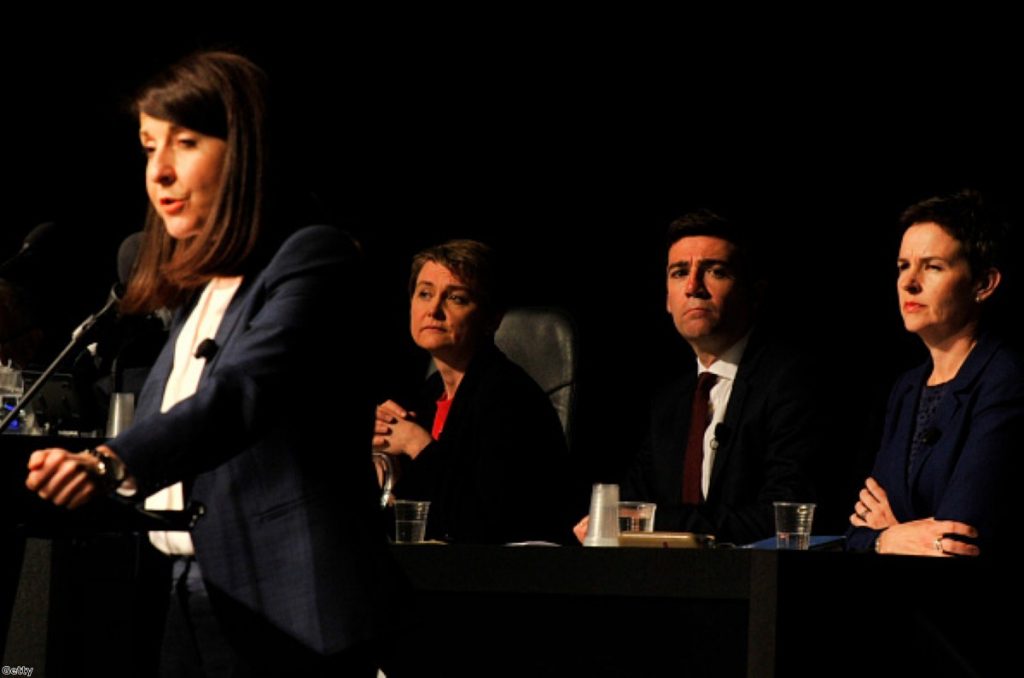What Jeremy Corbyn could learn from Liz Kendall
After a very drab and lifeless Labour leadership race, the sudden surge in support for Jeremy Corbyn has at last provided some entertainment by scaring the hell out of most media commentators. A private poll reported by the Mirror this morning showed he had actually extended his lead over his rivals, with Yvette Cooper skipping over Andy Burnham to take the second spot while Liz Kendall, the only one of the candidates who has even a flicker of a chance of winning, trails in fourth.
The idea that a left-winger could win the Labour leadership is being treated as akin to a swarm of locusts blotting out the sun. The newspapers which spent so long praising Nigel Farage's hard-right agenda as plain-speaking, man-of-the-people political genius are now falling over themselves to warn Labour off electing someone radical on the left. Labour officials are double-checking everyone who signs up to the party as a potential 'entryist'. The party is as terrified of democracy as it has ever been. Its MPs curse Miliband for democratising the leadership election process.
In a political climate dominated by cynicism and stale managerial language, it's quite tempting to get behind Corbyn as a way of shaking things up a bit. Perhaps he could inspire more young people to vote. He certainly seems to resonate with many of them. Perhaps he could get northern working class voters to switch back from Ukip and Scots to switch back from the SNP, even if he is not likely to win the English suburbs.
So it seems strange to suggest that Corbyn could perhaps use a little more cynicism, given the wave he is riding is based on idealism. But the truth is, he could take a page or two out of Kendall's book.


Labour seems to have split into three factions: The beige, the red and the white. The beige – represented by Andy Burnham and Yvette Cooper – are mechanical, seemingly without political values, poor to middling media performers and change according to the prevailing political weather. Burnham, for instance, was a Blairite under Blair, a Brownite under Brown and a Milibandite under Miliband. Under none of those personalities did he appear to be a winner. The whites, representing the white flag contingent and currently led by Kendall, have only one tactic: surrender. They are Blairites without any of the intellectual underpinnings. The reds, under Corbyn, are singing from the same socialist hymn sheet as ever, with absolutely no changes, either ideologically or tactically, since the 1970s.
Is it so much to ask that we could ignore the beige, but have a little bit of red and white together? It is possible to get a genuine leftist into Downing Street, but it requires giving up on some of the political purity which seems to motivate Corbyn's supporters.
An electable left-wing candidate would pick three or so big but achievable goals – let's say renationalising the railways, an NHS constitution preventing private involvement and universal free childcare. And it would pick a couple of big areas in which it would triangulate the Tories. Let's say spending 0.5% more of GDP than whatever they are spending on defence and committing to making all schools free schools.
They would then hammer the Tories on those issues – asking constantly why they were not prepared to keep Britain secure, why they were letting down children by not going far enough on education reform. They would embrace a fight with the anti-arms trade groups and teaching unions. They would make it impossible for the press to paint them as Old Labour Arthur Scargills. And doing so would allow them some of the political space to make the case for, and force through, major left wing reforms.
This sort of strategy seems completely lost on the party. Labour is polarised between total idealism on one hand and total lack of idealism on the other, with an awful lot of beige in the middle. The idea you might use cynical means to accomplish idealistic goals seems completely dead in this new age of political simplicity.
It would be much better if Corbyn and Kendall sat down together and listened. They've a lot to learn from one another.









